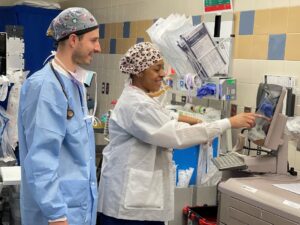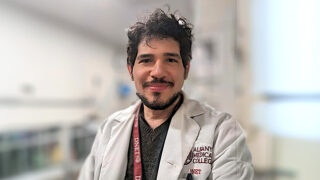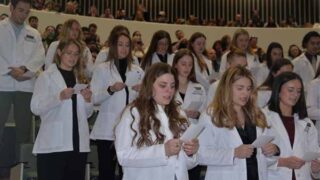
We offer a Doctor of Nursing Practice (DNP) degree.
Clinical Affiliations
Albany Medical Center, part of the Albany Med Health System, is the primary campus for clinical experiences.
The clinical portion of the program is enhanced by rotations to multiple clinical affiliation sites in New York State.
- Bassett Medical Center (Cooperstown)
- Canton-Potsdam Hospital (Potsdam)
- Carthage Area Hospital
- Catholic Charities Care Coordination Services (Albany)
- UHS Chenango Memorial Hospital (Norwich)
- Claxton-Hepburn Medical Center (Ogdensburg)
- Columbia Memorial Health (Hudson) (Albany Med Health System)
- Ellis Medicine (Schenectady)
- Glens Falls Hospital (Albany Med Health System)
- Keller Army Community Hospital (West Point)
- St. Joseph’s Hospital (Syracuse)
- Saratoga Hospital (Albany Med Health System)
And two sites in Massachusetts:
- Baystate Medical Center (Springfield)
- Berkshire Medical Center (Pittsfield)
Clinical rotations are subject to change to meet accrediting agency requirements.
Simulation Experience
In the Patient Safety and Clinical Competency Center, students will participate in low and high-fidelity simulation experiences throughout the curriculum as a method to enhance critical thinking skills and competence as an anesthesia practitioner. Simulated learning experiences include, but are not limited to: the induction, maintenance, & emergence from anesthesia; ACLS/PALS recertifications; crisis resource management; regional anesthesia techniques; central line placement; ultrasound practices; EKG rhythm interpretation; and identification & treatment of cardiac/pulmonary pathology.
Students will also participate in gross anatomy cadaver pro-section experiences provided by the College’s Anatomical Gift Program.
Accreditation
The Center for Nurse Anesthesiology is registered with the New York State Education Department, Office of the Professions and accredited by the Council on Accreditation of Nurse Anesthesia Educational Programs (COA). The COA is a specialized accrediting agency recognized by the U.S. Department of Education and the Council for Higher Education Accreditation. The COA is located at 10275 W. Higgins Road, Suite 906, Rosemont, IL 60018-5603 (224-275-9130). Learn more here.
In 2019, the Center for Nurse Anesthesiology was granted a 10-year accreditation which is the longest accreditation cycle administered by the COA. The Center for Nurse Anesthesiology continues to meet the COA’s threshold pass rate on the National Certification Examination (NCE). The NCE first-time pass rate for the class who graduated in 2022 was 80%. The class size was 25 students, attrition rate was 0%, and employment of graduates within 6-months of graduation was 100%.
Americans with Disabilities Act
The Center for Nurse Anesthesiology complies with the requirements of the Americans with Disabilities Act of 1990, and Section 504 of the Rehabilitation Act of 1973.
Applicants shall not be discriminated against on the basis of race, color, national origin, sex, religion, age, marital status, physical or mental handicap or disability, or any other legally protected factor.
To successfully progress through the nurse anesthesiology program, applicants must be able to perform the essential functions or tasks of an anesthetist using the following abilities listed below.
- Discriminate variations in human responses to disease using visual, auditory, tactile and other sensory clues.
- Discriminate changes in monitoring devices and alarms using visual and auditory senses.
- Communicate clearly and effectively in English through oral and written methods in order to interact with other health care providers and patients of all ages.
- Coordinate gross and fine motor movements through the senses of touch and vision to safely provide all aspects of General, Regional and Monitored Anesthesia Care, as well as possess the endurance to handle multiple patient needs. Examples of such care includes, but is not limited to, such tasks as: insertion of intravascular and intra-arterial access lines, administration of regional anesthetics, performance of airway management and the ability to respond to in-house emergencies in a timely manner.
- Demonstrate sufficient physical strength to perform airway management.
- Demonstrate sufficient physical strength to move and position patients and equipment.
- Sufficient stamina to stand or sit for prolonged periods of time.
- Safely maneuver the operating room and other anesthetizing locations.
- Respond appropriately to alarms and changes in patient conditions that require physical interventions.
- Use reason, analysis, calculations, problem solving, critical thinking, self-evaluation, and other learning skills to acquire knowledge, needed to comprehend and synthesize complex concepts.
- Interpret information derived from auditory, written and other visual data to determine appropriate anesthetic management plans.
- Apply theoretical knowledge in practice to provide safe anesthetic care.
- Demonstrate personal and professional ethical behavior, self-control, tactfulness, sensitivity, compassion, honesty, integrity, empathy and respect.
- Work flexibly and effectively in stressful and rapidly changing situations.
- Cooperate with other members of the health care team to provide a therapeutic environment and safe patient care.


